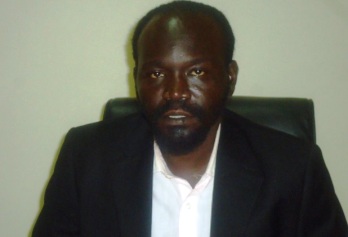South Sudan’s PLP calls for renegotiation of IGAD power sharing proposal
June 17, 2015 (WAU) – Leader of the newly established People’s Liberal Party (PLP) in South Sudan, Peter Mayen Majongdit, said a power-sharing proposal revealed by the East African regional bloc (IGAD) to end the 18-month long civil war in the country needed to be renegotiated by the parties in an inclusive process.

In greater Upper Nile region reforms are to be effected with the reverse of giving the rebel faction 53% in charge of the three states of Unity, Upper Nile and Jonglei in the oil-rich region. The government in that region will get 33% and former detainees plus other political parties to equally share the remaining 14%.
Majongdit however said the draft deal was unfairly distributed, questioning why should only 10 individuals of former detainees be given a share in the 14% with the other political parties while majority of these individuals were already members of the national parliament or ruling party’s political bureau.
“Why should the former political detainees share 14%,” he inquired.
He was referring to the notion that the 10 membership of the former detainees, sometimes known as G10, were just individuals without declared constituencies as far as the war is concerned. Critics also describe them as “opportunists” who were only hoping for an opportunity to sneak into the leadership of the country by portraying themselves as neutral “good boys” in the eyes of the international community while they were partly responsible for the current crisis.
According to Majongdit, he argued that the former detainees were either members of the SPLM highest political executive and legislative organs which should share from the 53% taken by the government because there were cadres of the SPLM if the Arusha agreement was to be incorporated into IGAD proposal.
He further warned that other opposition political parties might reject the participation in a transitional government of national unity if not allocated proper percentage.
“That means it will not be called government of national unity in the absence of opposition parties,” he said.
Majongdit, whose party base is in Warrap state from where he hails, further revealed that his political party may not take part in the transitional government and shall only focus on preparations for the upcoming general elections at the end of interim period.
“PLP shall be aspiring for country’s leadership when the time is due, through election, so it has no interest to be part of government which they shall soon challenge. Our priorities are peace for now,” he said, adding that the preparations may not be easy.
He said there was need for institutions such as election commission to be independent from government’s influence.
He also stressed the need for the peace talks to be inclusive, rather than bilateral between the warring parties so that issues were also widened beyond the mere power-sharing to include ensuring that accountability was addressed.
He also called on IGAD and the warring parties to extend power-sharing deal in the other two greater regions of Bahr el Ghazal and Equatoria, saying these regions equally needed reforms and the change should therefore not be benefiting only Upper Nile region.
The opposition leader, who hails from Warrap state like president Salva Kiir, was kidnapped this year, severely beaten and detained for several days by security operatives. He said as a condition for his release he was warned not to talk much about the shortfalls in the country’s leadership or risk disappearance. He however said he defied such threats against his constitutional right.
PLP was formed earlier this year with the aim to create liberal democratic society with human values, according to its statement. Since its formation the party chairperson has been actively engaged in the country’s political affairs winning public attraction.
(ST)
